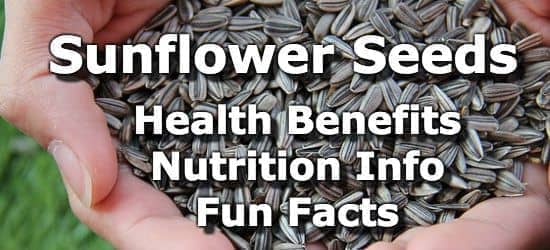Top 5 Health Benefits of Sunflower Seeds + Nutrition Info and Fun Facts
Sunflower seeds are growing in popularity every year and with all their nutrient and health benefits it is not difficult to see why.
Sunflower seeds can alleviate chronic inflammation, and reduce the risk of cancer, aging, cognitive decline, and heart disease. Further sunflower seeds are a low-carb snack, reducing the risk of type II diabetes.
Sunflower seeds are a great source of vitamin E, phosphorus, selenium, manganese, copper, fiber, and numerous B vitamins. With all those nutrients there is no reason not to try consume at least 1-2 handfuls of sunflower seeds a day.
Read on below to find out more details on sunflower seed's health benefits, nutrient info, and fun facts.
Sunflower Seeds Health Benefits
1. Sunflower Seeds are High in Vitamin E
Sunflower seeds are a top source of vitamin E. A one ounce handful of sunfower seeds provides 9mg (45% DV) of vitamin E. Health benefits of vitamin E include reduced risk of heart disease, alleviation of chronic inflammation, reduced risk of cognitive decline, and a reduced risk of ALS (Amyotrophic Lateral Sclerosis, Lou Gehrig's Disease) (1).
2. Sunflower Seeds are a Great Source of Protein
A one ounce handful of sunflower seeds provides 5.5grams (11% DV) of protein and all the essential amino acids (2). Sunflower seeds rank number 5 on the list of nuts and seeds highest in protein, and are a good vegan source of protein as well.
3. Sunflower Seeds can Help Reduce the Risk of Heart Disease
Like most nuts and seeds sunflower seeds are full of heart healthy fats and fibers which can reduce the risk of sudden cardiac death by as much as 50% (3). Further, sunflower seeds are high in folate (vitamin B9) which can help reduce the risk of cardiovascular disease (4).
4. Sunflower Seeds are a Low Carb Snack
Sunflower seeds are 50% fat, 19% protein, 9% fiber, and only contain 6% net-carbs (2). Net-carbs are carbohydrates less non-digestible fiber. The high fiber, fat, and protein content of sunflower seeds reduce the risk of type II diabetes.
5. Sunflower Seeds can Reduce the Risk of Cancer
Sunflower seeds are a good source of vitamin E and selenium, both of which are considered potent antioxidants. Further, selenium is instrumental in DNA repair which can help prevent the formation of cancer (5).
Sunflower Seeds Fun Facts
- The Ukraine leads the world in sunflower seed production, accounting for almost a quarter of all sunflower seeds grown worldwide.
- On average a sunflower contains 1000-2000 seeds.
- Sunflower seeds are primarily composed of polyunsaturatd fats.
- Sunflower seeds can also be made into a butter, like peanut butter, and may be a good substitute for people allergic to peanuts.
- The sunflower originated in North America.
